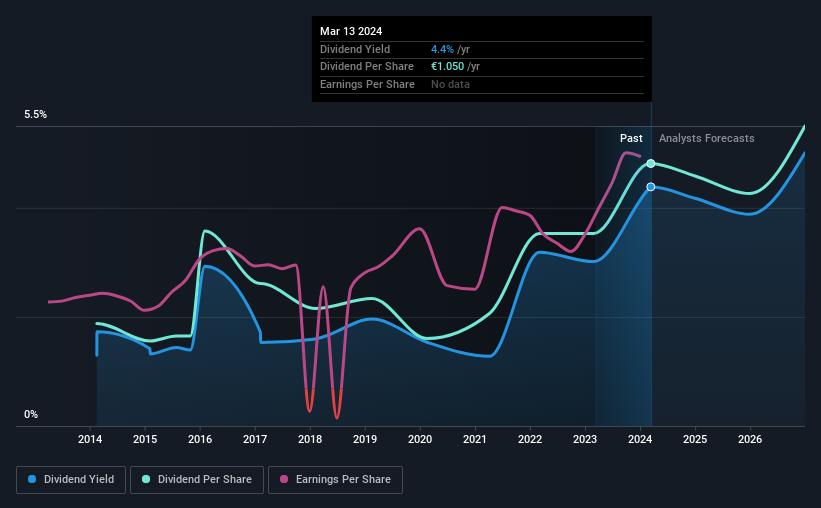
Palfinger AG's (VIE:PAL) dividend will be increasing from last year's payment of the same period to €1.05 on 18th of April. This makes the dividend yield 4.4%, which is above the industry average.
View our latest analysis for Palfinger
Palfinger's Dividend Is Well Covered By Earnings
We like to see robust dividend yields, but that doesn't matter if the payment isn't sustainable. Before making this announcement, Palfinger was paying a whopping 117% as a dividend, but this only made up 34% of its overall earnings. The business might be trying to strike a balance between returning cash to shareholders and reinvesting back into the business, but this high of a payout ratio could definitely force the dividend to be cut if the company runs into a bit of a tough spot.
Looking forward, earnings per share is forecast to rise by 32.3% over the next year. If the dividend continues along recent trends, we estimate the payout ratio will be 27%, which is in the range that makes us comfortable with the sustainability of the dividend.

Dividend Volatility
The company's dividend history has been marked by instability, with at least one cut in the last 10 years. Since 2014, the dividend has gone from €0.41 total annually to €1.05. This implies that the company grew its distributions at a yearly rate of about 9.9% over that duration. We have seen cuts in the past, so while the growth looks promising we would be a little bit cautious about its track record.
The Dividend Looks Likely To Grow
Given that the dividend has been cut in the past, we need to check if earnings are growing and if that might lead to stronger dividends in the future. Palfinger has impressed us by growing EPS at 15% per year over the past five years. With a decent amount of growth and a low payout ratio, we think this bodes well for Palfinger's prospects of growing its dividend payments in the future.
In Summary
Overall, we always like to see the dividend being raised, but we don't think Palfinger will make a great income stock. With cash flows lacking, it is difficult to see how the company can sustain a dividend payment. We would be a touch cautious of relying on this stock primarily for the dividend income.
Companies possessing a stable dividend policy will likely enjoy greater investor interest than those suffering from a more inconsistent approach. Still, investors need to consider a host of other factors, apart from dividend payments, when analysing a company. Taking the debate a bit further, we've identified 2 warning signs for Palfinger that investors need to be conscious of moving forward. If you are a dividend investor, you might also want to look at our curated list of high yield dividend stocks.
New: Manage All Your Stock Portfolios in One Place
We've created the ultimate portfolio companion for stock investors, and it's free.
• Connect an unlimited number of Portfolios and see your total in one currency
• Be alerted to new Warning Signs or Risks via email or mobile
• Track the Fair Value of your stocks
Have feedback on this article? Concerned about the content? Get in touch with us directly. Alternatively, email editorial-team (at) simplywallst.com.
This article by Simply Wall St is general in nature. We provide commentary based on historical data and analyst forecasts only using an unbiased methodology and our articles are not intended to be financial advice. It does not constitute a recommendation to buy or sell any stock, and does not take account of your objectives, or your financial situation. We aim to bring you long-term focused analysis driven by fundamental data. Note that our analysis may not factor in the latest price-sensitive company announcements or qualitative material. Simply Wall St has no position in any stocks mentioned.
About WBAG:PAL
Palfinger
Produces and sells crane and lifting solutions in Austria and internationally.
Undervalued with adequate balance sheet and pays a dividend.
Similar Companies
Market Insights
Community Narratives




